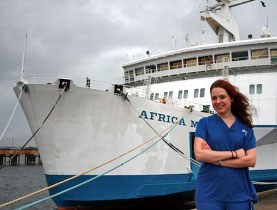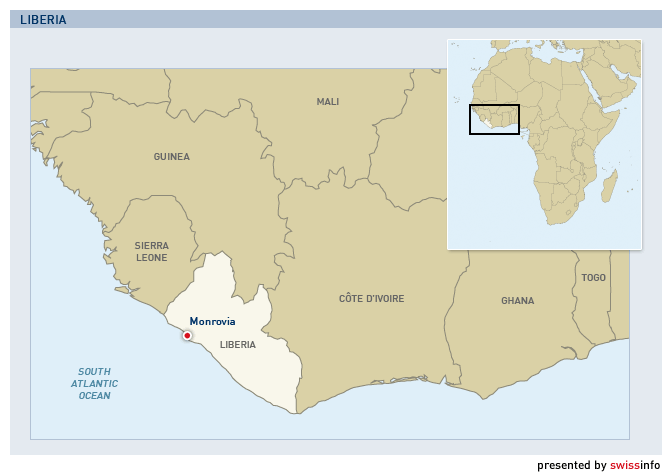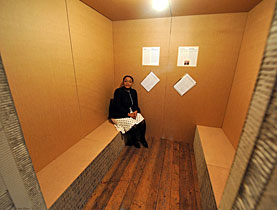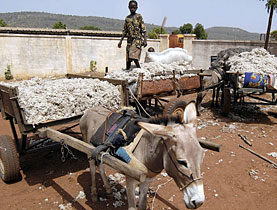From Liberia, with Mercy

The operating room is somewhat cramped, the halls narrow and the orderlies from all over the world, but little else would distinguish this hospital from any other.
Except that this hospital has been built inside a ship and that outside its cool confines – air-conditioned appropriately to American sensibilities – is the port of Monrovia and several thousand shipping containers ready to move in or out of Liberia.
Below deck aboard the Africa Mercy, a hospital ship operated by the charity Mercy Ships, Dany Kyburz, a 29-year-old Swiss operating-room nurse prepares for surgery.
For this two-month mission on the ship, she is on a team specialising in repairing a devastating childbirth-related injury known as obstetric fistula.
They are part of a larger cast of medical professionals trying to fill the gap between what’s offered by constrained African governments and the serious challenges facing many of their citizens.
Most surgeries Mercy Ships provides are unavailable in these countries – at any price. Here, they are free.
The charity will leave Liberia in November, having spent ten months repairing cataracts, cleft lips, burns, disfigured limbs and removing massive craniofacial tumours. It will travel to Benin in 2008 but its work will not be enough – the organisation has never been able to serve every prospective patient in the 70 countries it has visited over 30 years.
But it has earned high esteem particularly within the small countries lining the South Atlantic coast of West Africa where it has placed its focus over the past decade.
A good reputation
“Ma-cee sheep,” my taxi driver confirms approvingly in thick Liberian English as he navigates a 1990s-era Mazda – what seems to qualify as a limousine here – to the port on a Tuesday morning. Rainy season is on the way out and a warm mist and puddles in the battered roads are the remnants of the previous night’s deluge.
Few people I have spoken to in Monrovia have not heard of the organisation, a sort of mix of traditional non-governmental organisation and religious order: it is undeniably the product of a Christian worldview, its missionary ethos coexisting with the practical realities of operating in the developing world.
Some of its fondest praise has come by leaders of Muslim-majority states.
In the operating room, or off-ship, within a community rehabilitation project, there are few apparent differences between Mercy Ships and other NGOs whose signs pepper the roadsides of poor countries around the world.
However most of the staff with this organisation are not only volunteers but pay for their stays on the ship. They are often sponsored by churches, community groups and private donors from their home countries; the charity says this allows it to direct its resources to beneficiaries.
“It’s not normal that you pay to work. And I understand that others don’t understand, especially my colleagues in Baden with whom I worked. I also can’t explain it,” Kyburz admitted.
“But that’s okay and for me it’s okay that I have to pay. If you spend some time on the ship, you understand what goes on behind the scenes and you understand what needs to be paid for. Where else should the money come from?”
Swiss nurse
This is Dany Kyburz’s second short-term mission with Mercy Ships. In 2007, she took a month off her job as an operating room nurse in the northern city of Baden. The charity asked her to return this year and looking for a change of venue, she left her job and came here for two months.
She told swissinfo that her work here allows her to combine her professional skills with her religious convictions.
“Mercy Ships is a good institution because I can do what I am used to – working in the operating room – and in missions,” she said. “In a lot of missionary work, you can’t do what you’re used to doing back home.”
Business in the fistula ward two decks below could in many respects resemble the inside of a Western hospital.
“We meet in the OR and we discuss the daily schedule, if there are any changes and after that, we set up for the first case, we send up for the patient,” Kyburz explains.
“My job is to take the patient in, to help the anaesthesiologist with the equipment, to prepare the patient and to set up everything. After that, we do our schedule – usually three cases per day.”
There are real differences though, she admits.
“The cleaning is another part I have to do here, which is very different from back home, where we don’t need to clean,” Kyburz says. “You would never see that in Switzerland, a doctor mopping the floor.”
The patients, she says, are very shy, and even though Kyburz’s English is excellent and even though Liberia’s official language is English, she often has difficulty getting through.
“If you have to communicate with the patients, they just look at you like, ‘What language is she speaking?’ and then you have to get the translators. They tell the patients exactly the same words, which makes me think, ‘What am I talking here?’ But it didn’t just happen to me. It happened to Americans and Canadians.”
“Absolutely key”
Switzerland, a landlocked country boasting only a modest merchant navy, would seem an unlikely place to launch a maritime operation.
“Switzerland was absolutely key to the founding of Mercy Ships,” Don Stephens, the charity’s founder, told swissinfo.
“I think that goes all the way to the founding of the Red Cross,” he added. The organisation maintains a national office and its creative department less than an hour from Geneva, the home to many of the world’s major non-governmental organisations.
The story began 30 years ago in the city of Lausanne with Stephens, the young American missionary. From his account, he had a vision, a lot of enthusiasm but not much else.
Originally from Colorado and having come to Switzerland to train with the Christian organisation Youth With a Mission, Stephens had the idea of establishing a fleet of hospital ships and began the process of soliciting support.
With its many financial institutions, Switzerland would be a good place to start, he thought.
“In today’s terminology, we would say I was looking for venture capital and each of the banks I went to were very polite of course,” he said.
Tough questions
“They would ask questions like: ‘Do you have maritime experience?’ Of course I did not. ‘Do you have medical experience?’ Of course I did not. The closest I could claim was my wife, who was a nurse, so they politely declined venture capital to purchase the first ship,” he said.
Stephens fortunately had contact with the owners of Suisse Atlantique, at the time one of the country’s major shipping firms, who advised him as he developed a feasibility study and financial plans.
Unbeknown to him, somebody had put in a good word on his behalf to a major Swiss bank, which would provide him financing. He was 33 years old when he won the vessel at auction.
The $1 million purchase price of the ship Victoria amounted to half its scrap metal value.
But with an army of volunteers and years of patience, Mercy Ships over four years retrofitted the former cruise liner, re-christened Anastasis – Greek for “Resurrection” – and the rest is history.
Since 1978, the organisation has put several ships into service but has decommissioned all but the Africa Mercy, a converted Danish rail ferry, which Stephens says allows the organisation to operate more efficiently.
He added that the organisation was studying whether it should expand its fleet with another used ship or whether it should build its own. Thousands are waiting, he believes.
“That’s the beauty of a ship-based hospital, that you can deploy it anywhere in the world,” he said. “We are doing studies as well of the Indian subcontinent, several different nations in Asia. But Africa could certainly use two ships if not more.”
swissinfo, Justin Häne in Monrovia, Liberia
Mercy Ships estimates it has delivered services valued over $670 million (SFr773 million) over 30 years, impacting more than 1.9 million people.
Its doctors have performed more than 35,000 operations including cleft lip and palate repair, cataract removal, orthopaedic procedures, facial reconstruction and obstetric fistula repair.
Close to 240,000 patients have been treated in village clinics.
It has performed more than 190,000 dental procedures and coached 14,500 local healthcare professionals.
Mercy Ships has completed 950 community development projects.
The organisation has a staff from more than 40 countries.
Headquartered in Texas, Mercy Ships has offices in 15 countries.
Liberia is a small country on the west coast of Africa. It is bordered by Sierra Leone, Guinea and Ivory Coast.
Liberia’s population is close to 3.5 million and it has a land area of over 111,000 square kilometres.
Its GDP per capita is $357.
Some of the country’s earliest ethnic groups are the Mende, Gola, Kru and Kissi.
Portuguese, Dutch and the British traded with the country up until the late 1600s.
In 1822, black Americans established Liberia as a colony, bringing their own social and cultural values and norms.
In conflict between these Americo-Liberians and the country’s indigenous people, the latter usually lost out.
In 1980, a coup by a soldier, Samuel Doe, drove an already deteriorating country into deeper trouble.
The country experienced around ten years of dictatorship and another 14 years of civil war before peace was declared in 2004.
The country’s current president, Ellen Johnson-Sirleaf, is of indigenous and Americo-Liberian decent. She is a Harvard-trained economist and former bank executive and official with the United Nations.
She is one of Africa’s most respected leaders but must deal with politicians loyal to the former president, Charles Taylor, who is on trial for war crimes before a UN court.


In compliance with the JTI standards
More: SWI swissinfo.ch certified by the Journalism Trust Initiative




You can find an overview of ongoing debates with our journalists here . Please join us!
If you want to start a conversation about a topic raised in this article or want to report factual errors, email us at english@swissinfo.ch.